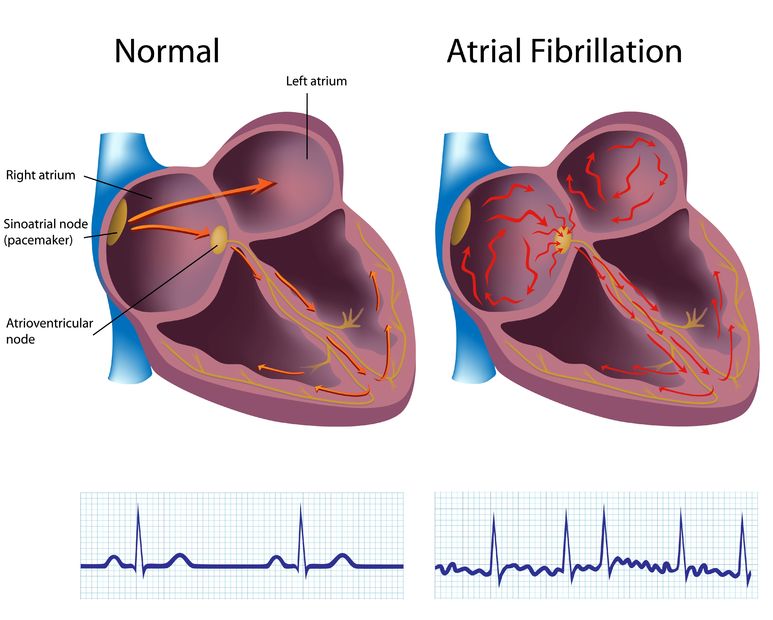ACC (The American College of Cardiology) and Heart Rhythm Society, in collaboration with the Bristol Myers Squibb-Pfizer Alliance, are launching an innovative project to improve management of atrial fibrillation in underserved communities. TRANSFORM: Atrial Fibrillation Quality Initiative (TRANSFORM: AF) will give clinicians and health systems tools to improve adoption of guideline-directed medical therapy in targeted patient populations by putting the right resources in front of the right people at the right time to drive measurable changes in performance.
Atrial fibrillation (AFib) is the most common cardiac arrhythmia worldwide and a leading cause of stroke, heart failure, cardiovascular morbidity and sudden death. When AFib remains untreated, there is a fivefold higher risk of developing stroke and a twofold higher risk of death from stroke; however, up to one-third of patients experience no symptoms and are unaware they have AFib.
“Early and effective treatment is critical for appropriate management of AFib, but some communities are disproportionately impacted by this disease because of low rates of early intervention,” said James Januzzi, MD, TRANSFORM AF co-chair, ACC Board of Trustees member and director of the Dennis and Marilyn Barry Fellowship in Cardiology Research at Massachusetts General Hospital (MGH). “Through TRANSFORM: AF, we’re giving clinicians tools to better understand AFib risks to improve treatment decisions and monitoring for future complications in a way that meets vulnerable patients where they are.”
TRANSFORM is an 18-month program that will provide a comprehensive set of tools and resources for appropriately managing atrial fibrillation by leveraging telehealth, monitoring tools and virtual care. Lessons learned from the project will help to ensure that telehealth and virtual care improve access to equitable healthcare, rather than exacerbate existing inequalities in our healthcare system.
“TRANSFORM AF provides us a unique opportunity to use telemedicine and artificial intelligence to better identify, risk stratify and treat the underserved vulnerable population, enabling collaborative and patient-centered care,” said Jagmeet Singh MD PhD, TRANSFORM AF co-chair, member of the HRS Governance Committee and founding director of the Resynchronization and Advanced Cardiac Therapeutics Program at MGH.
The program will be overseen and driven by the clinical leadership of ACC and HRS, along with the ACC’s Taskforce on Health Equity and HRS’s Digital Health Committee. The groups will initially conduct a baseline assessment with support from HealthReveal, a leading clinical artificial intelligence company, to identify high-risk patient populations from underserved communities experiencing economic disparities and barriers to care within selected regions and systems of focus.
Assessment findings will inform the most effective tools and educational interventions to address identified gaps in care, including patient education tutorials, quality improvement clinician toolkits, digital consumer health monitoring devices and clinician education. Through the alliance, HealthReveal will recommend life-saving patient care interventions to increase physicians’ adherence to guideline- directed medical therapy, preempt future adverse cardiovascular events and improve patient outcomes.
This initiative is the latest under the TRANSFORM umbrella. ACC introduced TRANSFORM as a new kind of quality research program aimed to improve health care by transforming the quality of care across the multi-faceted areas of cardiovascular disease. TRANSFORM programs leverage clinical registry data, office-based interventions and partnerships to include the pharmaceutical and medical device industry, health plans, employers, clinicians and patients.
HRS quality improvement (QI) efforts support that vision through our Optimize Outcomes initiatives that…
- are led by heart rhythm specialists committed to improved care and outcomes
- engage the global heart rhythm community to address gaps and disparities throughout the world
- leverage the diversity, strength and unity of the HRS membership
- foster collaboration, communication and care coordination between all clinicians that treat heart rhythm patients
- concentrate on systems-based improvements, with the potential to result in the largest impact
- evolve with the most recent science and knowledge
- focus on the patient

